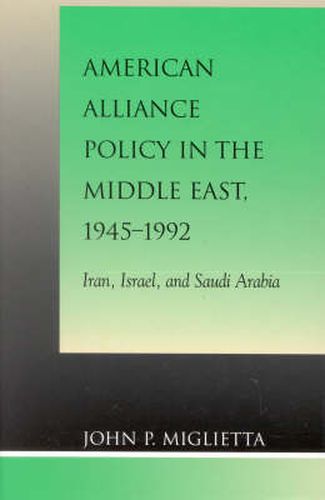Readings Newsletter
Become a Readings Member to make your shopping experience even easier.
Sign in or sign up for free!
You’re not far away from qualifying for FREE standard shipping within Australia
You’ve qualified for FREE standard shipping within Australia
The cart is loading…






A look at US Cold War diplomacy, examining a policy compromised by the demands of anti-communist ideology. Through case studies of America’s relationships with Iran, Israel and Saudi Arabia, John P. Miglietta reveals how an overriding fear of global communism led to the over-commitment of US security resources to the region. The perceived need to preserve Middle East stability rendered US policy ineffectual and unresponsive to changing local strategic conditions, drastically altering the patron-client paradigm to the detriment of American strategic interests. This analysis of American foreign policy-making illustrates how Cold War paranoia prevented the evolution of traditional military alliances into broader-based relationships and perpetuated authoritarian regimes that mired the Middle East in a cycle of poverty and despotism.
$9.00 standard shipping within Australia
FREE standard shipping within Australia for orders over $100.00
Express & International shipping calculated at checkout
A look at US Cold War diplomacy, examining a policy compromised by the demands of anti-communist ideology. Through case studies of America’s relationships with Iran, Israel and Saudi Arabia, John P. Miglietta reveals how an overriding fear of global communism led to the over-commitment of US security resources to the region. The perceived need to preserve Middle East stability rendered US policy ineffectual and unresponsive to changing local strategic conditions, drastically altering the patron-client paradigm to the detriment of American strategic interests. This analysis of American foreign policy-making illustrates how Cold War paranoia prevented the evolution of traditional military alliances into broader-based relationships and perpetuated authoritarian regimes that mired the Middle East in a cycle of poverty and despotism.